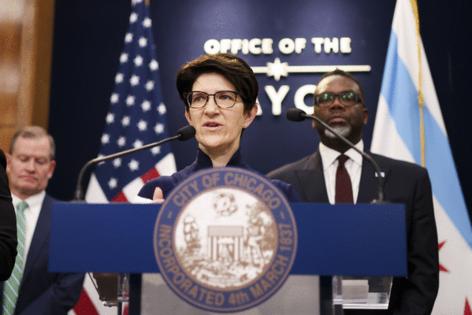Chicago Mayor Brandon Johnson's CFO says property tax hike 'likely' in 2026 budget
Published in News & Features
CHICAGO — Chicago Mayor Brandon Johnson’s team teased plans this week to take another swing at raising property taxes to close the city’s more than $1 billion budget gap, despite an aldermanic revolt last year and continued resistance to such a hike.
Asked in an interview with Bloomberg’s Romaine Bostick whether a property tax increase would again be proposed for the city’s 2026 budget, Chief Financial Officer Jill Jaworski said “it is likely that that will be part of the package,” without addressing how to garner support from the City Council to pass it.
One of Johnson’s “budgeteers” last year, Alderman Matt O’Shea, 19th, said he would need to see major cuts and efficiencies to be won over.
“And if it doesn’t happen, I’m a no vote, and so are the majority of my colleagues,” he said. “We need to start talking about stuff we never talked about before.”
Jaworksi affirmed cuts will also be part of the mayor’s budget package, but said the administration is “hoping to avoid” reducing services.
She suggested the city would be addressing a chief complaint from the business community about the unpredictability of property taxes. “You’re thinking about investment, uncertainty is the enemy, right?”
It’s a similar line to the one Mayor Lori Lightfoot used when she successfully proposed tying annual property tax hikes to 5% or the rate of inflation, whichever was lower.
Johnson, who campaigned against raising property taxes and instead pitched other progressive revenues, backed off of Lightfoot’s policy in his first budget, only to renege last year amid a nearly $1 billion deficit. Aldermen preemptively voted against that hike. The final budget instead included a bigger share of one-time fixes — including using federal pandemic dollars and prior-year surplus — to close the gap.
Ratings agencies that help determine how much the city will owe on debt have cited a lack of progress finding “permanent and high impact solutions” to close its budget gap as black marks. Property taxes are among the most stable and predictable revenues the city can raise on its own.
Fitch also dinged the city earlier this year for its pursuit of other revenues “that require state or voter support, which do not appear to be forthcoming in the near term.” Jaworski has argued the state should legalize taxing services. Johnson has called for taxing the rich, but since the failure of the “Bring Chicago Home” referendum, has not proposed how the city would do it.
Alderman Brian Hopkins, 2nd, said he appreciated Jaworski’s commitment to a balanced budget, but cautioned Johnson’s administration to not start discussions by saying a property tax hike is necessary.
It is the mayor’s job — not Jaworski’s — to sell the public on such a tax hike, and a critical part of doing that is showing the math that would make it necessary, Hopkins said.
“People don’t want to be told it’s inevitable and unavoidable, because they don’t believe that,” he said. “It’ll spark a rebellion. People will feel manipulated and like something is being forced down their throats.”
While currently opposed to a property tax hike, Hopkins said “I don’t think we can rule out anything.”
_____
©2025 Chicago Tribune. Visit chicagotribune.com. Distributed by Tribune Content Agency, LLC.







Comments